After doing OMAD for a few months, I’ve noticed a huge difference in how my body feels, depending on what time of the day I had my meal.
I realized that the best time to eat one meal a day is in the afternoon, from 4 to 8 pm. When I eat in the afternoon, I feel more comfortable with falling asleep.
In this article, I will help you decide when is the best time to eat on OMAD.

When should you eat your one meal a day?
After experimenting with OMAD for many months, I noticed the best time for me is around the afternoon.
Eating after 4 pm allows me to have energy during the day, exercise in the midday, and stay longer in ketosis.
On the other hand, eating one big meal early in the morning made me feel tired for the rest of the day.
It does matter what time you eat
For me, it does matter what time I eat. I noticed that meal timing often influences my energy and ability to fall asleep.
Typically, if I eat in the morning, this raised my blood sugar up and left me feeling more tired later on.
“Meal timing can impact your circadian rhythms, which is the body clock that tells you when to be awake and when to fall asleep,” says Professor of Exercise and Sport Sciences at the University of Padova, Antonio Paoli, MD.
“Circadian rhythms are strongly influenced by melatonin levels.”
“Melatonin is high, typically after the meal, and it drops the longer you fast after,” explains Dr. Paoli.
Dr. Paoli suggests that “to improve your body composition, lose fat, and improve your insulin sensitivity, having your meal in the evening or late afternoon will be the best option.”
What time of day is best for OMAD?
I noticed that I feel at best when I eat my one meal a day in the afternoon. In the afternoon, the body has enough time to digest the food.
On the other hand, when I eat too late at night, I usually struggle to have a good rest.
However, if your lifestyle only allows you to eat later on at night (or early in the morning) then you should try to accommodate OMAD to fit into your lifestyle or choose a different fasting protocol.
One meal a day in the morning
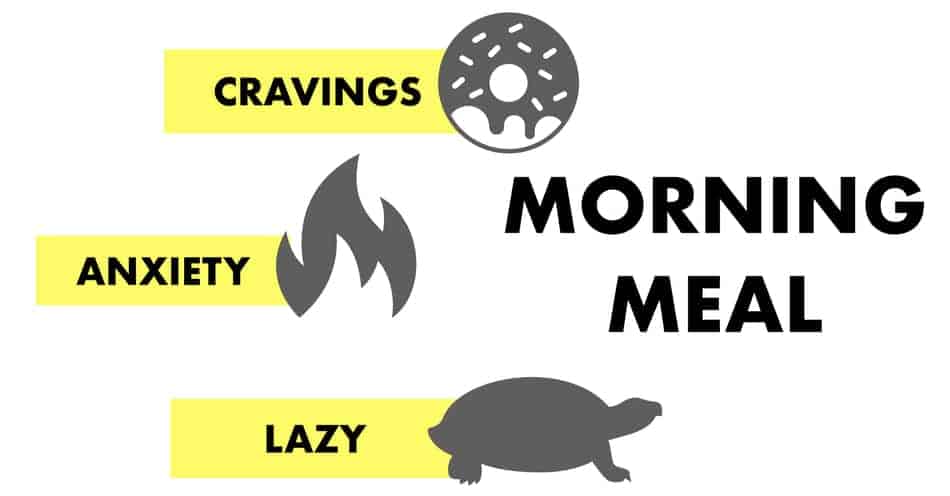
When I did OMAD, mornings were a disaster for me. When I eat too much in the morning my day crushes immediately.
It felt like I could go back to bed. Too much food cause my sugar to rise. And once all this spike comes back down I’m ready for the nap. This means I didn’t have the energy to exercise.
I wasn’t able to stay focused on my job. And I felt lethargic all morning (and afternoon).
When I eat my OMAD meal in the morning, evenings were the worst. Once my sugar rush wears off, and I somehow manage to crawl to 6 pm, now I have this battle with my mind.
All the food cravings start to kick in. And, because my work was slowing down towards the evening, now I have more free time on my hands, so it’s easy to get bored (and hungry).
One meal a day in the evening
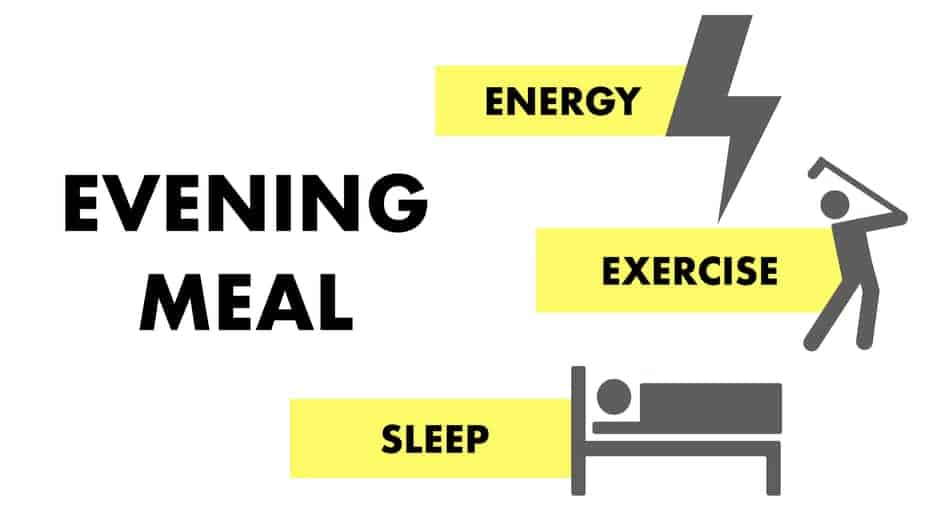
For me, eating in the evening is better. Waiting till the evening (or late afternoon) extends my time in ketosis, helps me to sleep better, and makes the process more durable.
In other words, moving my meal (just a couple of hours) toward the end of the day, allowed me to enjoy my day with full power, instead of feeling lethargic and experiencing uncomfortable food cravings.
One meal a day at night
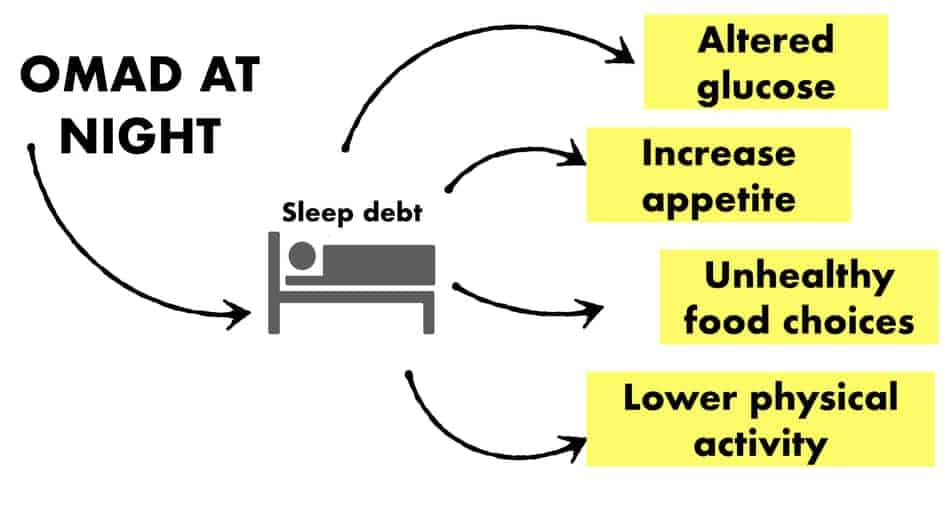
Eating one meal a day at night isn’t the best idea. It usually impacts (negatively) my sleep, and my long-term health, and well-being.
I was never a big fan of nighttime eating anyway, especially before bed. I noticed I have bizarre and disturbing dreams after eating the majority of my food late at night.
“Nighttime eating can have adverse metabolic effects, disturbance in the circadian rhythm, and changes in the endocrine system,” says sleep expert, Karine Spiegel, Ph.D.
“Late-night eating can lead to poor sleep quality, sleep debt, tiredness, and greater appetite during the day,” adds Dr. Spiegel.
“Sleep debt is when your body doesn’t receive enough sleep at night. And, once the body doesn’t get enough sleep for a longer period of time it starts to make some nasty adaptations,” says Dr. Spiegel.
In her recent clinical trial published in the Lancet Journal, Dr. Spiegel explains “6 consecutive nights of 4 hours of sleep was enough to lower glucose tolerance (ability to dispose of a glucose load) by 40% and insulin tolerance by 30%”.
“Sleep debt showed alterations in leptin and ghrelin that are responsible to regulate hunger and appetite. Leptin is an appetite-inhibiting hormone, and ghrelin is an appetite-stimulating peptide,” says Dr. Spiegel.
In other words, the less you sleep, the more likely you’re to be hungry.
That’s exactly what happens to me.
(Graph below perfectly illustrates my cravings after a full night’s sleep versus 4 hours of sleep.)
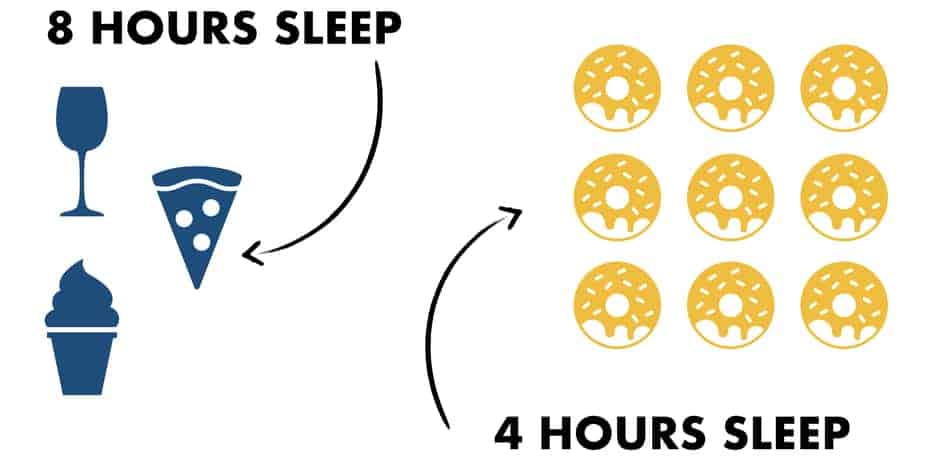
In her other clinical trial published in the Annals of Internal Medicine Journal, Dr. Spiegel concluded that “2 days of 4 hours of sleep was enough to increase ghrelin by 28% and reduce leptin by 18%.”
(See the graph below.)
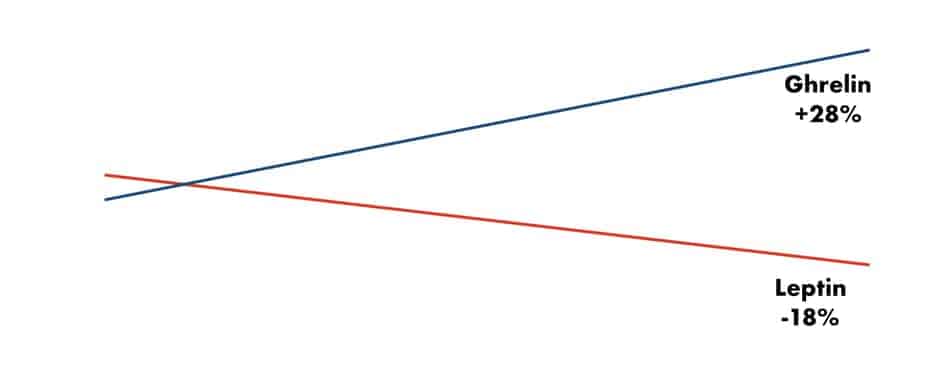
Another reason why I don’t like to eat one meal a day at night is the lack of energy to train. When I’m rested, I don’t even question whether to go or not for a workout or not (I just go).
When I’m tired and sleep-deprived (even after one night) my willingness to train goes significantly down.
Is it bad to eat one meal a day before bed?
I’m gonna play devil’s advocate here for a moment.
There is some evidence that shows consuming a small meal before bed can lead to weight loss, according to Sandia M. Waller, MS, RD.
In her study, Dr. Waller concluded that “consuming a small cereal meal, 90 minutes after the evening meal, just before bedtime, for 4 consecutive weeks lead to reduced total daily caloric intake, and therefore, weight loss.”
This shows that eating food late at night isn’t as that bad if you’re eating relatively small portions. On the contrary, if the late-night meal is the biggest meal of the day, then the effects will be negative.
How to choose the right time for OMAD?
When choosing your meal timing, you should take into considerations things like:
- Your lifestyle
- Your work arrangements
- Your home environment
- Your travel schedule
So you may even discover that OMAD is not really a good fit for you. In that case, don’t worry. There are plenty of other options.
Also, ask yourself:
- How busy are you?
- Are you currently working from home?
- What type of work do you have?
- Are you ok with having zero food during the day?
- Can you exercise on the empty stomach?
As an alternative, you can experiment and change the intermittent fasting method for something more manageable.
Conclusion
There are a couple of lessons I learned from eating just one meal a day.
The first is that timing is important because it just dictates my entire day. If I eat in the late afternoon, I can stay focused in the morning without any food. I can do my most important work before eating.
My meal doesn’t start until around 6 pm. This is when I can relax. I usually have everything done for the day. The schedule is closed. The blog is done. I can sit down and authentically enjoy my meal.
The second is the importance of sleep. I often neglected to have a good night’s sleep whereas now I actively pay attention to my sleeping hygiene.
